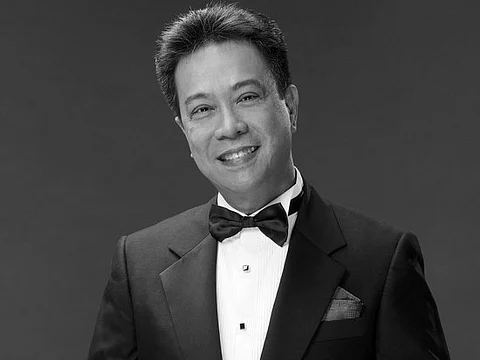
- NEWS
- the EDIT
- COMMENTARY
- BUSINESS
- LIFE
- SHOW
- ACTION
- GLOBAL GOALS
- SNAPS
- DYARYO TIRADA
- MORE

Angelito “Hajji” Alejandro, once the toast of Manila’s concert halls and college campuses, has always had a voice that could melt hearts and stir nostalgia. With his effortless charm, soulful croon, and timeless ballads, he became a fixture in the golden era of Original Pilipino Music (OPM) and earned the moniker “Kilabot ng mga Kolehiyala”—the college girls’ heartthrob. But behind the music, Hajji’s life is a testament to the enduring power of passion, resilience, and love.
Born on 26 December 1954 in Alaminos, Pangasinan, Hajji rose to fame as a member of the iconic Circus Band in the 1970s. Alongside fellow OPM stalwarts like Basil Valdez, he helped define the sound of a generation coming into its own—Filipino, proud, and in tune with the world. But it was when he went solo that Hajji truly took flight.
In 1978, he became the first-ever winner of the prestigious Metro Manila Popular Music Festival with the immortal anthem “Kay Ganda ng Ating Musika”—a song that would not only become his signature, but also a declaration of pride for Filipino artistry.
His hits “Panakíp Butas” and “Nakapagtataka” soon followed, both becoming emotional staples on the airwaves and karaoke machines, further cementing his status as a pop icon.
In the 1980s, Hajji temporarily stepped away from the spotlight and opened a small restaurant along Melrose Avenue in Los Angeles, California with his wife, actress and beauty queen Rio Diaz. Their love story was admired by many—a beautiful couple who blended glamour and quiet devotion.
Together, they had a son, Ali Alejandro, now the drummer of the band Delara. Hajji is also the proud father of another musical talent, singer Rachel Alejandro, from a previous relationship.
But tragedy struck in 2004 when Rio Diaz passed away after a courageous battle with colorectal cancer. Hajji, ever the devoted partner, stood by her through it all. Her death left a deep mark on him, but also shaped his advocacy and empathy for those dealing with illness and grief.
Now, in a heartbreaking turn of events, life has come full circle. In March 2025, Hajji’s longtime partner revealed that the singer has been diagnosed with stage 4 colorectal cancer. The news sent waves of emotion throughout the music community and among fans who grew up with his music. Messages of support, prayers, and tributes continue to pour in, a reflection of the indelible mark he has left on Philippine culture.
Yet through it all, Hajji Alejandro remains composed and gracious—still a performer at heart, still the same voice that brought meaning to so many lives.
As OPM continues to evolve, and as new generations discover his music, Hajji’s legacy endures not only in melodies and lyrics, but in the very spirit of Filipino musical excellence. The man who once sang about the beauty of our music now reminds us of its true power—to heal, to remember, and to hope.
Indeed, the music of Hajji Alejandro—kay ganda pa rin, at kailanma’y hindi malilimutan.
